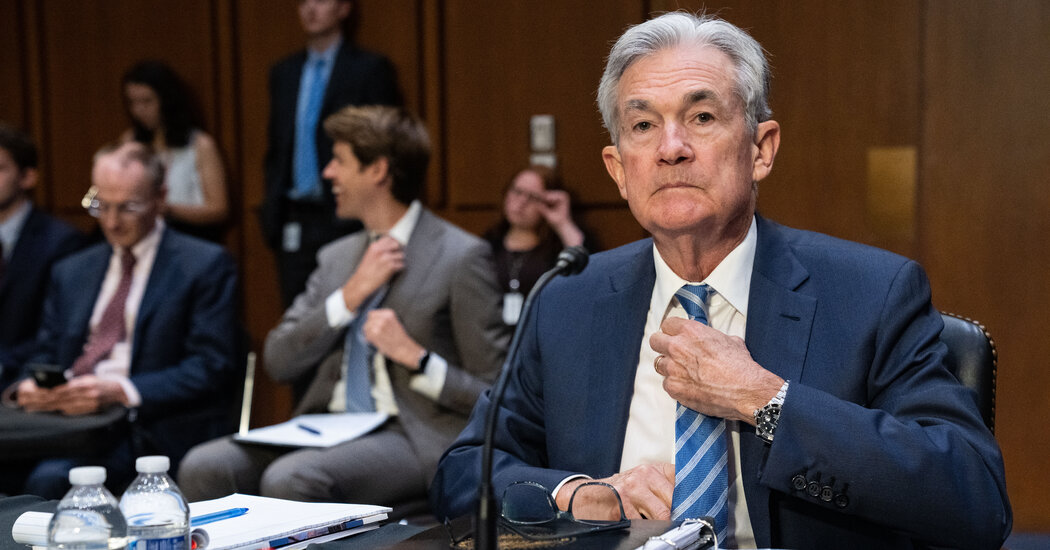Federal Reserve chairman Jerome H. Powell said it was unclear whether the global pressures that kept price increases slow and steady for years before the pandemic would ever return — and underlined that it was critical for the central bank to stabilize prices in a new and more disrupted world.
“We have experienced a period of disinflationary forces around the world,” Mr Powell said Wednesday in a panel alongside the heads of the European Central Bank and the Bank of England. “Since the pandemic, we live in a world where the economy is driven by very different forces, and we know that. What we don’t know is whether we’re going back to something that’s more like, or a bit like, what we had before.”
He added: “We suspect it will be some kind of blend.”
The Fed chairman said the job of the central bank was to find price stability and maximum employment in the new economic situation.
Inflation is high in many developed economies, supported by rapidly rising gas prices, high food costs and supply chain problems that started early in the pandemic and have accelerated since then. Part of inflation in the United States is driven by strong underlying domestic demand – apartment rents are rising sharply, hotel room prices are much higher and a variety of services have become more expensive. But those shared global problems are also driving much of the recent price hikes.
As inflation in the United States is at its fastest pace in four decades, Fed policymakers have quickly raised interest rates to try to bring it back under control. three quarters point in June. Central bankers have indicated that they want to raise interest rates well above 3 percent before the end of the year, from their current range of 1.5 to 1.75 percent.
“The purpose of that is to slow growth so supply has a chance to catch up,” Powell said Wednesday. “It’s a necessary adjustment that has to happen.”
Mr Powell acknowledged that slowing the economy to try to contain inflation is “very likely to involve pain”. But he noted that “the worst pain would be not to deal with this high inflation and let it continue.”
The Fed is trying to cool the labor market and slow consumer and business spending, hoping to balance demand with limited supply, which would help tame prices.
The labor market is currently unusually hot, which has contributed to the increase in wages. The unemployment rate has fallen rapidly from double-digit levels in 2020 to 3.6 percent, nearly the lowest level in half a century, and there are now nearly two job openings for every job applicant in the United States. Fed officials hoped that given that underlying strength, they might be able to slow conditions significantly without sending the economy into full-scale recession.
But central bankers, including Mr. Powell, have emphasized that achieving that optimistic outcome has become more challenging.
“We don’t have precision instruments,” acknowledged Mr. Powell on Wednesday, adding that “the events of the past few months have made it considerably more challenging, especially thinking of the war in Ukraine, which contributed immensely to inflationary pressures.”
“It’s gotten harder, the trails have gotten narrower,” said Mr. Powell on a so-called soft landing. “Yet that is our goal.”
While some economists have warned that inflation could slow more quickly than expected and that the Fed would unnecessarily hurt the labor market and the economy in general in its quest to cool down, Mr Powell said the greater risk is that consumers and businesses will price higher. , making it more difficult to bring prices back under control.
“Is there a risk that we go too far? There is certainly a risk,” said Mr. powell. “But I don’t agree that this is the biggest risk to the economy. The bigger mistake we would have to make would be not to restore price stability.”
The Fed chairman acknowledged that it is difficult to understand what is happening to prices at a time when major supply shocks – such as commodity shortages and the war in Ukraine’s impact on fuel and food – are shaping such a large part of the situation. .
And after a year in which economists were repeatedly surprised by how long those shocks lasted, he expressed humility about policymakers’ ability to understand what might come next.
“We now understand better how little we understand about inflation,” said Mr. powell.


